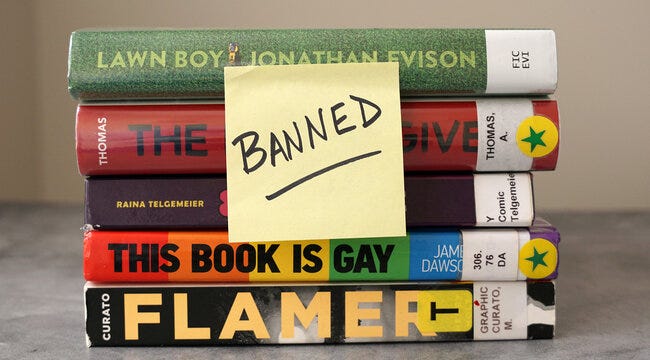My Banned Book Reading Journey
Standing Up Against Censorship
In today's world, where information flows freely and ideas are exchanged at lightning speed, the act of banning books seems almost archaic. Yet, it persists, a stark reminder of the ongoing battle for intellectual freedom. I wanted to share the start of my adventure of reading books from the banned book list. I'm not tackling the list alphabetically. Instead, I'm starting with books I already have and then moving on to ones that catch my interest. The list is huge (like, huge), so I won't be able to get through all of it, but I'm determined to read at least around 50-100 books. As I finish each book, I’ll write about what I think of the book here with you. I am excited to share this journey with y’all!
Why Do Books Get Banned?
Books get banned for all sorts of reasons. Sometimes it's because of explicit content, bad language, or themes that some people think aren't suitable for certain age groups. But honestly, a lot of the time, it's about controlling what people think and talk about. Books that deal with race, gender, and sexuality often get targeted because they challenge the status quo.
For example, To Kill a Mockingbird by Harper Lee has been banned because of its racial slurs and tough look at racial injustice. The Catcher in the Rye by J.D. Salinger gets banned for its profanity and teenage rebellion themes. These books make us face uncomfortable truths and question societal norms.
The Fascist Roots of Book Banning
Book banning is not merely an act of censorship; it is a tool of authoritarian control. Banning books isn't just about keeping things "clean," it's a way to control people. Think about Nazi Germany, where they burned books to suppress ideas they didn't like. By restricting access to diverse perspectives and critical thinking, these regimes sought to create a homogeneous society that aligned with their oppressive ideologies. Today, book bans are still used to silence voices and keep certain narratives out of the public eye. It's a form of propaganda that preys on fear and ignorance. They are still used to silence voices and keep certain narratives out of the public eye. It's a form of propaganda that preys on fear and ignorance.
In modern times, book bans often target literature that challenges the status quo, focusing on works that highlight marginalized voices and experiences. This kind of censorship uses fear and xenophobia to further marginalize vulnerable communities and stifle intellectual freedom.
My Reading Journey
So far, reading these banned books has been a wild ride. Each one offers a fresh perspective and makes me think deeply about different issues. For example, Art Spiegelman's Maus is a powerful story about survival during the Holocaust, and Toni Morrison's Beloved dives deep into the complexities of race and the legacy of slavery. These books have opened my eyes and made me more empathetic.
Reading banned books feels like a rebellious act against those who want to silence important voices. It's about standing up for intellectual freedom and resisting censorship. Through this journey, I've gained a deeper understanding of the power of literature to provoke thought, evoke empathy, and inspire change.
The Impact of Banned Books
The impact of reading banned books goes beyond personal enlightenment. These works often spark broader social and cultural conversations. They challenge readers to question their assumptions, confront their biases, and engage with complex issues in meaningful ways. By reading and discussing banned books, we can foster a more inclusive and open-minded society.
For instance, George Orwell's 1984, a dystopian novel about a totalitarian regime that uses surveillance and propaganda to control its citizens, has sparked countless discussions about privacy, freedom, and government overreach. Similarly, Margaret Atwood's The Handmaid's Tale, which explores themes of gender oppression and authoritarianism, has resonated with readers worldwide, especially in contemporary debates about women's rights.
Wrapping Up
Banning books is a dangerous practice that threatens our freedom and democracy. By reading and sharing these banned books, we can push back against censorship and make sure diverse voices are heard. My journey, so far, through the banned book list has been a powerful reminder of the importance of intellectual freedom and the power of literature.



